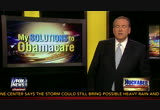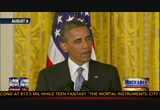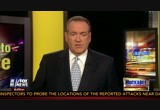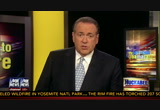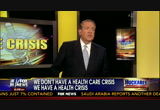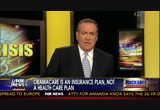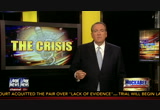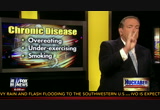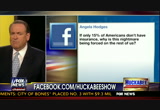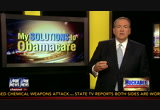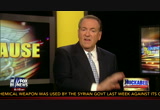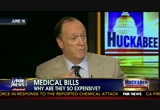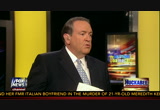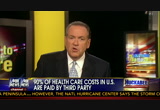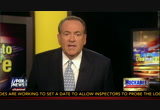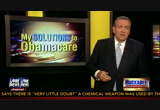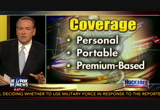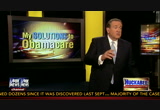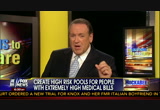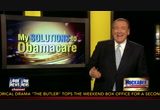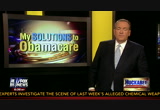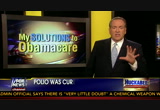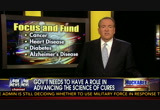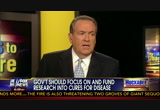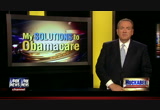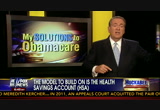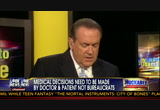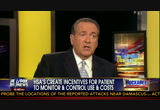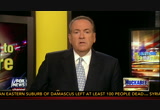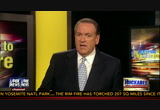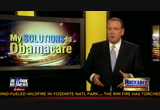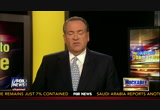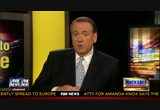tv Huckabee FOX News August 25, 2013 5:00pm-6:01pm PDT
5:00 pm
happy birthday to my mom. i can't tell you her age because she won't tell me. i'm harris faulkner. thanks for watching. have a great week everybody. "huckabee" starts. tonight on "huckabee," with his signature legislation broken, the president continues to blame republicans. >> the one unifying principle in the republican party at the moment is making sure that 30 million people don't have health care. >> but it is not just the gop that doesn't like obama care. >> i just see a huge train wreck coming down. >> i'm of the belief the aca is probably the most complex piece of legislation ever passed by the united states congress. >> democrats, the irs, and even unions have major issues with obama care. the president says no one has a better plan. >> what are the solutions to
5:01 pm
obama care. some say we don't have them. i say we do. >> tonight, the cost, the cure. a "huckabee" special. the governor solutions to obama care. ladies and gentlemen, mike huckabee. [ cheers and applause ] >> thank you, thank you very much. we've got a great audience here. and let me say welcome to "huckabee" from the fox news studios in new york city. all right. train wreck, hopelessly complex, will destroy the 40 hour work week, devastate american working people. those are some comments about obama care. those were the ones made by people that supported it. president obama rejected republican input on the bill, then he's complained ever since that the republicans aren't in favor of it. i wonder if he looked around to see how many of the democrats are still all jacked up about
5:02 pm
it. last week i asked obama insider austan goolsbee if he could think of a single democrat running for re-election that was running on obama care instead of running away from it. can you name me any democrat in the country who is running on his or her support for obama care as the primary platform to which they would like to be reelected? because personally, i can't think of anybody running with it. they're running from it. >> that may be a fair point. i'm just a policy guy though. so i'm not watching all of the races. >> i'm watching as many as i can. i can't find anybody that says boy, that will get me reelected. just last month, the president again falsely accused republicans are not having any options of their own. >> at least they used to say well, we're going to replace it with something better. there's not even a pretense now that they're going to replace it with something better. >> congressman tom price of
5:03 pm
georgia who prior to being in congress was an orthopedic surgeon has a bill in the house that's full of ideas. and the governors in all 50 states. >> now been in 57 states, one left to go. >> well, however many states there are, 50, 57. governors have had many creative, innovative ways to bring a greater level of health care to their citizens that doesn't break the bank or require total submission to the government. no doubt about it, it is true, i have been brutal in my criticism of what would better be called the not so affordable care act. but i am not alone. the irs that's going to administer the financial application has begged to be exempted, congress and their staffs swung a sweet deal to get themselves subsidized around painful increased costs to them. half the deadlines imposed for
5:04 pm
the law have been missed, and the administration is having to hire tens of thousands of so-called navigators to try to explain this 2300 page monstrosity to people that try to sign up, even though there won't be time to run a background check on these navigators, so you might end up giving conditional financial and medical information, even your social security number, to people who are felons, identity thieves. what could go wrong? now, for the ten and a half years i was governor i probably spent about as much of my time trying to deliver health care to our citizens as anything, and in most every state the governor runs the largest employee health insurance pool in the form of the state employees health plan. the medicaid plan is the largest insurance plan of the state. tonight, buckle up, hang on.
5:05 pm
it is going to be a show unlike any we have ever done before. i promise you this, you're going to hear some simple solutions that work. we'll also take questions from the studio audience and be answering some of the questions that you've been sending in this week. i am not going to spend my time or yours just reciting the problems of obama care. i'm going to give you common sense solutions that could radically transform our health care system. i have to tell you, i really hoped the president would watch our show tonight. i really did. so i sent word that if the president wanted options to his train wreck, we'd be presenting them. i got this response from assistant white house press secretary matt foley with the president's reaction. >> well, la di fricking da. >> maybe he won't stay through
5:06 pm
the whole show, but i'm pretty sure you're going to like our solutions a whole lot better. i really do. [ cheers and applause ] all right. i'm going to talk to the audience tonight. i want you to be here with us. audience, first of all thank you for coming. we're going to have a great time here tonight. and let me begin by saying that we really don't have a health care crisis in america. you hear that all the time. we have a health care crisis. no, we don't. we have a health crisis. if you think about it, people from all over the world come here for health care, don't they? why? because we have an incredibly good health care system. what we don't have is a nation of healthy people. and the result is that the costs are out of control. i want to begin to talk about what we need to do to make positive changes. by the way, one of the
5:07 pm
challenges i had with obama care from the beginning is it is not a health care reform system, not a health reform system, it is an insurance program. that's what it is, it is an insurance program. i want you to think about that. making people covered, having them insured is a good thing, but it doesn't make them healthier. if it did, having home insurance would make your home safer, right? having car insurance would give you better miles per gallon. if you have life insurance, you would never die. so the fact is having insurance may help only to give you greater access to the doctor, which may have the residual effect of making you healthier. but the real issue in this country is addressing the fact that we are a nation that's pretty sick. don't know if you know this, 80%, about 80% of health care costs in the united states is dealing with chronic disease. we live longer but we don't live
5:08 pm
healthier. let me give you a little fact here that may just really shock you. 75% of your lifetime health care costs will happen in your last two years of life. that figure comes from dr. kenneth cooper, the originator of aerobics, probably som that studied more about health care and the longitudinal effects of health care over the longest period of time in america. i want you to think about it. if you live to be 80, up until you're 78 years old, you only spend 25% of your health care dollars from the last two years from 78 to 80, you spend 75%. why? because we don't run to the finish line. we don't walk to the finish line. we basically are drug to the finish line, like the movie where the dead man was put on the horse and made to appear he
5:09 pm
was still alive when he wasn't. think weekend at bernie's. okay? that's our health care system. we are all but dead. but we continue to spend money in those last months of our lives. so what i want to do tonight is talk about the reasons we're in the mess we're in. we're going to look at it from the standpoint of what is the crisis, what's the cause, how did it happen. and then we're going to get into the cure. how do we really fix it. president says there aren't ideas. i tell you that there most certainly are. now, let me give you some reasons. why do we have such an issue with chronic disease? basically other than genetics which you can't fix it is all behavioral. three basic behaviors cause most chronic disease. what are they? overeating, under exercising and smoking. what we have in this country is
5:10 pm
we have a culture of disease rather than culture of health. and by the way, you see it in all forms of our culture, even as depicted in the media. >> i went a lot of miles training for that day, downed a lot of donuts. they taste good and have the sugar i need to get me going in the morning. that's why chocolate donuts have been on my training table since i was a kid. >> there you go. that's the issue. we are a sick nation and all of the insurance in the world isn't going to make us healthier. that ought to be the goal of the health care reform that we talk about. we asked you at home to send your questions and concerns. angela hodges says if only 15% of americans don't have insurance, then why is this nightmare being forced on the rest of us? i'll talk about that. we're going to tell you why we need to prioritize prevention,
5:12 pm
i'm a careful investor. when you do what i do, you think about risk. i don't like the ups and downs of the market, but i can't just sit on my cash. i want to be prepared for the long haul. ishares minimum latility etfs. investments designed for a smoother ride. find out why 9 out of 10 large professional investors choose ishares for their etfs. ishares by blackrock. call 1-800-ishares for a prospectus, which includes investment objectives,risks, . read and consider it carefully before investing. risk includes possible loss of principal.
5:13 pm
[ male announcer ] staying warm and dry has never been our priority. ♪ catering to the conveniently lated has never been our priority. our priority is, was and always will be serving you, the american people. we get to see everyone in america almost every day. and we've noticed that you're sending and receiving more packages than ever. so we wanted to give you a more reliable way to ship them. with improved priority mail flat rate. don't just take our word for it -- now we'll prove it every step of the way with tracking up to eleven scans, specified delivery dates, and free insurance up to $50 all for the same low rate. we'll never stop delivering for every person in this country. [ woman ] we are the united states postal service. [ man ] we are the united states postal service.
5:14 pm
[ woman #2 ] we are the united states postal service. [ male announcer ] we are the united states postal service. and our priority is you. go to usps.com® and try it today. >> talk about our specia welcome back to the special edition of "huckabee," common sense solutions to the health care issue in america. before the break, i told you about a question from angela hodges. it was this. if only 15% of americans don't have insurance, why do we all have to deal with obama care? it is a great question, angela. one we've all been asking. it is one of the reasons a lot of people have had angst about the system. rather than getting coverage for the uninsured, we turned the entire health care system in the country on its head. and the result is higher costs, not exactly where we need to go. i told you about the crisis. i want to talk about the cost.
5:15 pm
what's important is why has our system completely collapsed within itself? let me say something to you. the reason is because the whole system is upside down. this is an upside down system. let me give you an example. what we ought to be focusing on is prevention of disease. what do we focus on in america? intervention. we wait until people are catastrophically ill, then rush in with the most expensive modality of medical treatment ever designed. and the result is a health care system like we have which delivers extraordinary levels of expensive intervention, rather than the less expensive alternative of prevention. let me tell you what our priorities ought to be. if i were making this up, here is how it would go. biggest priority, preventing. secondly, can't prevent it, cure it. if you can't cure it, then sure, you treat it. that's the way it ought to go.
5:16 pm
prevent it, if you can't cure it, if you can't, treat it. we do the opposite. we focus in this country on treating things. that's where we spend most of our money. we spend a little bit trying to cure. we spend very little on trying to prevent. and you wonder why the cost is so high. the reason may not surprise or shock you. because money is in treatment. that's where the money is. you ever heard the saying follow the money. well, not too many weeks ago i had steven brill on my show. we talked about the role of money in the health care system. >> we basically have been living in two economies in this country the last ten years, the economy you and i know, where people are hard pressed, jobs are tight and money is tight, then the health care economy where everybody is doing well except maybe the nurses and doctors, but the
5:17 pm
people that sell the equipment, the people that make the drugs, the people that run the allegedly nonprofit hospitals are all making ridiculous amounts of money. >> therein is a lot of the problem. money is being made hand over fist in the health care industry, unfortunately it is not necessarily going to you to make you better, but to make certain elements of the health care providers much wealthier. what's really sad, you know who's not getting call it a fair share of the health care dollar? your doctor. believe it or not, your doctors are earning far less now than they earned several years ago. can you understand why people are getting out of medicine, fewer and fewer get in at a time when because of obama care and all of the new people on the insurance, we need more doctors, not fewer ones? why would people get into the health care system? well, here is what's happening to us. 17% of our gross domestic product, gdp means everything in our economy, everything,
5:18 pm
everything we buy, everything we sell, everything we rent. it is the totality, the soup to nuts edition of the economy. 17% of it goes to health care. the highest in the world. most countries maybe get to nine. underdeveloped countries are one or two. by the way, in 1963, it was 3% of gdp. we now spend $2.7 trillion a year in terms of our health care system. so if you want to know what the formula is for how it is getting this way, just think about that it is all about the money. >> show me the money! >> show me the money! >> show me the money! >> okay. you get the picture, right?
5:19 pm
[ applause ] let me talk a little about the health costs in this country. if you think about it, most of us lived our lives within a culture. i grew up in the south. i grew up in the south and grew up poor. i tell people my own battles with health have largely been geographical, they have been economic, they have even been religious. if you grew up in the south, you grew up with fried food. anybody here from the south? everything you ate was fried, right? everything. if it was a vegetable, fry it. a meat, fry it. dessert, fry it. fried salad, have a fried meat, potatoes, finish with a fried pie. you know why you fry foods in the south, poverty in the south went hand in hand. you take any food and batter and fry it, you increase the caloric value. we fried the food, that's how we
5:20 pm
survived. there's two things. you say what does religion have to do with it? anybody hear of baptists? do i have to tell you, when i was in grade school, i'll never forget, had show and tell. teacher said it is religion. a little jewish boy brought a monday or a, catholic girl brought a rosary, i was baptist, said bring something from your religion. i brought a covered dish. that's the only thing i knew. you understand. much of our health is related to our culture. another part of the reason that it is so expensive is because we have 90% of the health care costs in this country that are third party payment. what does that mean? that means the person that pays the bill is not the person receiving the treatment. if you're the patient, receiving the treatment, guess what. you probably have no idea what health care costs because you never see it. and when you're not involved in what it is costing and how it gets paid, you really don't
5:21 pm
care. and guess what, most americans don't care what it costs because they don't have to. the insurance company is paying for it. later in the show, i'll explain why that is a bad idea, tell you what we can do to fix it. the solution we had, 2300 pages, complicated. here is what doctor robert payne said on our show when i asked him to explain the complexities of health care. we are having some difficulty understanding some of the language of the bill that is complicated. let me read a section. i want you to see if you can help me make sense of this. here is what it says. in reference to medicare hospital patients. i quote. for discharges occurring in fiscal 2011, 2012, the secretary shall determine applicable percentage increase for purposes of subparagraph a using a con continuous linear sliding scale ranging from person for 24 hour
5:22 pm
low volume hospitals with 200 or fewer discharges of individuals entitled to or enrolled for benefits under part a. that seems like gobbledy goop. >> i have to try, again when i say try, talking about all of us, when i say all of us, i mean some. don't you think that in itself is something? >> you want to run that by me one more time? >> i can hold it in the mirror, see if you can read it forward. what we have, i guess adds to -- that's the second time i said that in two weeks. >> if dr. robert payne doesn't understand it, neither do we. that's why we have to have this conversation tonight. nicki armstrong commented on our facebook page, says my fears my elderly mother will be a victim of the death panel and allowed
5:23 pm
to suffer until she's dead. coming up, i'm going to address that. i'll tell you why politicians and bureaucrats should not be making medical decisions. stay with us on this special edition of "huckabee." decision. stay with us on this special n. edition of huckabee. in your busy day, the last thing you need is white marks. ♪ secret outlast clear gel goes on clear with 48 hour odor protection. to outlast your day...any day. secret outlast clear gel.
5:24 pm
they're the days to take care of to outbusiness..day...any day. when possibilities become reality. with centurylink as your trusted partner, our visionary cloud infrastructure and global broadband network free you to focus on what matters. with custom communications solutions and responsive, dedicated support, we constantly evolve to meet your needs. every day of the week. centurylink® your link to what's next. folks have suffered from frequent heartburn. but getting heartburn and then treating day after day is a thing of the past. block the acid with prilosec otc, and don't get heartburn in the first place. [ male announcer ] one pill each morning. 24 hours. zero heartburn.
5:25 pm
5:26 pm
before the break, we talked about nicki armstrong's concerns about the so-called death panels. well, you know, that is a concern to a lot of people. you might be reminded there was a point at which the president had a forum in the white house in which he was trying to answer questions about the future of health care coverage. somebody asked him about this very thing. what about my elderly mother who is very sick. can we expect health care
5:27 pm
coverage for her. here was his answer. >> at least we can let doctors know and your mom know that you know what, maybe this isn't going to help. maybe you're better off not having this surgery but taking the painkillers. >> ouch. don't have the surgery that will make you better, just take the pain pill, ride it out. that sounds like the stuff that john wayne would talk about, bite the bullet. that's not health care. that's avoiding health care. let's talk about if we could fix it, and if we could make a difference, what would we do. here are some things. number one, make sure all coverage was personal. personal. we also would make sure that it was portable. then we would try to make sure what we were doing in health care has a premium base to it. let me explain what that means in a nutshell here. personal means your health insurance, audience, think about
5:28 pm
this. shouldn't your health insurance be owned by you and not by your employer? chances are you're going to change jobs in your life, you change jobs, that means you change insurance. one of the real challenges. by the way, health insurance was largely a creation of post world war ii america and it was not done that way for health purposes, it was done that way for tax purposes so that people could get benefits without having to have tax consequences. did it ever make sense to congress to fix the tax consequence instead of revamping the entire system? maybe i'll share that, make it personal, that you own your health care. secondly, it is portable. you move, so does your health care. that's the way it works. your life insurance, if you go somewhere, say sorry, not the same person you were, we're not covering you any more. thirdly, this is important, the health care system will never be reformed in this country if not premium based. let me make clear i'm not just talking about to people on a private insurance plan, i'm
5:29 pm
talking about for people on things like medicaid. when you have nothing invested, you have nothing to gain by making sure there's any savings in the program at all. one of the great economic advisers, larry summers, has often been quoted as saying nobody washes a rented car. by the same token, nobody saves money if it ain't their money. so one of the things that has to be is co-pays and deductibles, not talking big ones, talking some that are affordable, so that every person has skin in the game. and every person understands what that cost of health care really, really is. without that it is simply not going to make a lot of sense. now, another factor, tort reform, has to be part of it. doctors ought to spend more time in the clinic looking after you than in the courtroom answering questions from lawyers.
5:30 pm
that's an important part. it is not going to completely fix health care in this country, but it is a part of it. and then create a high risk pool. by that i mean some people have extraordinary medical costs. sometimes it may be, you know, developmentally disabled child or could be an adult with a very serious disease that will require extraordinary amounts of health care. you know what we ought to be doing, making sure those people get the help they need without bankrupting their family. that's not only merciful, it just makes good sense. rather than put them into the traditional insurance pool that skews the cost for all people in the group, remove them out. here is an area where government ought to make some investment and being a part of that in the high risk pool. then the insurance becomes affordable. all right. let's go back to some of your facebook comments.
5:31 pm
dr. roberta nataloni says as a primary care doctor, my biggest fear is i wouldn't be able to keep my office open. coming up, talk about what the government needs to do to focus on what they can do to make americans' health care really work. that's next on this special edition of "huckabee." next on edition of huckabee. next on [ male announcer ] house rule number 33. coffee should come in one size: mug. stay grounded with the rich, bold taste of maxwell house coffee. always good to the last drop. yeah... try new alka seltzer fruit chews. they work fast on heartburn and taste awesome. these are good. told ya! i'm feeling better already. [ male announcer ] new alka seltzer fruits chews. enjoy the relief!
5:32 pm
5:33 pm
[ man ] you cannot make a bad choice. [ male announcer ] red lobster's endless shrimp! as ch as you like, y way you like! you can have your shrimp. and you can eat it, too. [ male announcer ] try our new soy wasabi grilled shrimp or classic garlic shmp scampi. all just $15.99 for a limited time. it's gonna be a hit this year. [ male announcer ] red lobster's endless shri is now! we would neveriss endless shrimp. [ male announcer ] but it won't last forever. so come and sea food differently.
5:34 pm
reinforced with scratch- resistant glass and a unibody made kevlar strong. okay google now. call my droid. the new droid ultra by motorola. when strength matters, droid does. live from america's news headquarters in new york, i am harris faulkner. the united nations says they reached agreement with the syrian government allowing inspectors to visit the site of alleged chemical weapons attacks. hundreds of people killed in a suburb of damascus, the capital city. it is already monday there. in theory, the inspectors should begin fact-finding soon. a senior obama administration official says there's little doubt the regime has gassed its
5:35 pm
citizens. a fire on the northern part of the yosemite park is covering 210 square miles. strong winds are in the forecast for tonight. that will make it worse. firefighters are rushing to build fire breaks to protect entire towns. it has been nine days, still only 7% contained. so big, outlying areas are seeing ash fall like snowflakes. i am harris faulkner. now back to "huckabee." ♪ all right, just before the break we had a question from our facebook page, a doctor concerned she is not able to keep her office open under obama care. that's a concern a lot of doctors i know have. it is why in a personal survey, i have been talking to doctors 186 out of 186 that i face to face had a conversation with just to ask them if they were supportive of obama care, all against it. talked to four doctors who were for it, all of them on
5:36 pm
university hospital teaching staffs or are salaried doctors and don't have to worry about the business side of medicine. what we need to be doing is empowering doctors to make the health care decisions. not the bureaucrats. doctors actually know you, know where you live, and they care. and they ought to be able to have not only adequate payment for what they do, doctors save our lives, i think that's pretty valuable. what about incentives in the health care system for the outcomes. you see, right now doctors have an incentive not to fix you real quickly. because if you keep coming back, they keep getting paid. what if a doctor rather than getting it right on the sixth time got it right on the first time. wouldn't it be better to reimburse him a bonus for having gotten it right early? doesn't that make sense? [ applause ] and that's one way to keep the doctor and you both in business. if you're going to deal with the health of america, we have to do a couple of things. we have to put a real focus on
5:37 pm
what's costing us the most and then we have to fund it. i remember growing up in the '50s. i remember going to the health clinics and to the public arena where we would stand in line to get our polio shot. i know some in the audience aren't old enough to know this. some of you are. don't you dare act like you're not. and you remember the polio shots, right? before 1955, people were scared to death of polio. came up with the vaccine, got the polio shots, never worried about it again. why? because this country decided it was worth putting a focus on, and we didn't just focus on it, we funded it. what we need today to look at the big diseases that cost the most money, think of it as taking a man to the moon. we need an apollo program. not to go to the moon again, although that's not a bad idea.
5:38 pm
what we need is to think about something of that magnitude, that kind of concentration like we did with the manhattan project in world war ii. there are four diseases costing so much of the health care dollars, cancer, heart disease, diabetes, alzheimer's. research in this has to be funded. by the way, government has to do it. i know you say wait a minute, i thought you were a conservative, you don't believe in a lot of government. let me tell you why government has to get involved. drug companies and other entities in the private sector only can invest and do things if they think there's going to be a return. they're not interested in curing or eliminating the disease, they're interested in treating it. the money is in the treatment, not in curing it or eliminating it. the government has a vested interest in eliminating it, because the government is going to be on the hook in medicare and medicaid for the most health care dollars in the entire system. and rather than just spending money treating people with chronic diseases, why don't we
5:39 pm
actually try to eliminate them? do you realize diabetes in america costs $245 billion a year? a year! alzheimer's, $200 billion a year! by the way, it is expected to be almost a trillion dollars by the year 2050. a trillion dollars just on one disease, alzheimer's. what if we decided as a country we were going to find out what really causes it, and we were going to eliminate it. that would not only be a magnificent effort for this country and its people and save the pain and hardship, but think about what it does for the economy, taking a trillion dollars of expenditure, putting it back into people's well-being. how many of you in the audience would think that was a better expenditure of money than something to treat the disease
5:40 pm
but rather eliminate it. so if we can fund collaborative research and bonus the successes, here is an idea. $5 billion bonus for whoever first comes up with a cure for cancer. $5 billion bonus for whoever comes up with a cure for alzheimer's to eliminate it. you say wow, that's a lot of money. did you hear what i said before. if we spend 245 billion on diabetes, wouldn't it make sense to bonus somebody 5, 10, 15, $20 billion to figure out a way to eliminate it? that, my friend, makes a whole lot more sense, and those are the kind of solutions that we need in america, take on what's costing us most of the money in the system. terry robinson had this to say on facebook. she says as a consumer, i'm most concerned my premiums are going to increase to the point that i can't afford it, and or my doctor won't take my coverage.
5:41 pm
i have a solution. health savings accounts. i'll tell you how they work when we come back. this is a special edition of "huckabee." this is a special edition of huckabee. [ male announcer ] frequent heartburn? the choice is yos. chalky... not chalky. temporary... 24 hour. lots of tablets... one pill. you decide. prevent acid with prevacid 24hr. all your imptant legal matters in just minutes. protect youramily... and launch your dreams. at legalzoom.com we put the law on your side. like carpools... polly wants to know if we can pick her up. yeah, we can make room. yeah. [ male announcer ] ...office space. yes, we're loving this communal seating. it's great. [ male announcer ] the best thing to share? a data plan. at&t mobile share for business. one bucket of data for everyone on the plan, unlimited talk and text on smart phones.
5:42 pm
now, everyone's in the spirit of sharing. hey, can i borrow your boat this weekend? no. [ male announcer ] share more. save more. at&t mobile share for business. ♪ at&t mobile share for business. ♪ ♪ (vo) purina cat chow. 50 years of feeding great relationship trust your instincts to make the call. to treat my low testosterone, my doctor and i went with axiron, the only underarm low t treatment. axiron can restore t levels to normal in about 2 weeks in most men. axiron is not for use in women or anyone younger than 18 or men with prostate or breast cancer.
5:43 pm
women, especially those who are or who may become pregnant and children should avoid contact where axiron is applied as unexpected signs of puberty in children or changes in body hair or increased acne in women may occur. report these symptoms to your doctor. tell your doctor about all medical conditions and medications. serious side effects could include increased risk of prostate cancer; worsening prostate symptoms; decreased sperm count; ankle, feet or body swelling; enlarged or painful breasts; problems breathing while sleeping; and blood clots in the legs. common side effects include skin redness or irritation where applied, increased d blood cell count, headache, diarrhea, vomiting, and increase in psa. ask your doctor about the only underarm low t treatment, axiron. humans. even when we cross our t's and dot our i's, we still run into problems. namely, other humans. which is why at liberty mutual insurance, to policies come with new car replacement
5:44 pm
and accident forgiveness if you qualify. see what ee comes standard test:. . . our policy? [ male announcer ] they say it was during an arm wrestling match that mr. clean realized the way to handle bigger, tougher messes was better leverage. that's why he created his new magic eraser handy grip. it has a handle that firmly attaches to the eraser so you get better leverage and more oomph with less effort. it's the perfect magic eraser for making stuff that's big and tough not so tough, after all. mr. clean's handy grip -- the newest member of the magic eraser family. in all purpose and bath. [ engine revs ] robinson is concerned her premiums will go up so high, she's is not going to be able to afford it. it is a good concern. under the current system,
5:45 pm
there's no reason they get lower because as i said earlier, 90% of the health care dollars are paid for by third parties. what's a real answer to that? i said for a long time, we need to be modeling the health savings account, the hsa. what does that mean. here is how it works. simple. you get a health insurance policy with a fairly high deductible, $2500. good chance is maybe your employer will put $2500 in your pocket, because it is cheaper for him. he sets aside $2500. it is yours. the first $2500 of health care costs that you have that year you pay for out of that fund. what if you don't spend it all. you get to keep it. you can hold on to it, pay taxes on it, or tax free, roll it to the next year. the 2500 might be 3500. now you have that. if you have extraordinary medical expenses and they get above the 2500, that's when the
5:46 pm
insurance kicks in. even then, you are bonused on the basis of how much you manage those health care costs. imagine if there was transparency in the system, which we need. you knew exactly what this doctor and this doctor was going to charge for an elective surgery, and you knew exactly what this hospital and that one over there would charge for the costs to the surgery, and you made the same kind of decision you would make that you make on anything else you purchase. i am not talking about emergency room care, i am talking about when you get a knee replacement, the cost can range dramatically and you don't know because you don't know how to ask the questions. in a health savings account, you have a role to play in managing the decisions. if you manage them well, it is to your financial advantage. if you manage them poorly, you still get covered, but you're not going to benefit financially from it. what if doctors didn't have to deal with the complicated
5:47 pm
insurance work and practice medicine. and if you want to file with insurance, there's a simple way to do it. after all, remember, your coverage is now personal and portable. that would make a huge difference. this also means, and audience, think about this, this means the medical decisions that are being made on your body are a transaction between you and the doctor. doesn't involve a government bureaucrat. i don't know how you feel about this, but my guess is there isn't a bureaucrat in washington that cares nearly as much about how you feel as you do and your doctor. am i right? [ applause ] so doctors rather than government ought to be primarily making these decisions, and they would if in fact there was an incentive for you. here are some ideas. we practiced this in arkansas.
5:48 pm
we gave discounts on health insurance if they would do a health risk assessment, it is a simple questionnaire that asked questions. didn't require them to do something. we also gave them discounts if they weren't smokers, if their blood pressure was in the normal ranges, if their blood sugar was in normal ranges. didn't penalize them if they weren't, we gave them incentive if they were. i don't particularly think the nanny boy concept of government is a good one, the government telling you what you can eat, can't eat because frankly most americans, you know what we do, we bow up, somebody tells us what we can't do, we say by gosh, that's what i am going to do. what we have got to do is change from a culture of disease to a culture of health. for those who say we can't change the culture in this country, let me suggest in my lifetime, i've seen four different cultural changes. litter, seat belts, smoking, and drunk driving. that's in my lifetime. now, i just want you to
5:49 pm
understand, i'll just take one, seat belts. when i was a kid, seat belts weren't in cars. if you wanted a seat belt, it was an after market device you had to put in your car. i tell you, where i came from, if you went to a mechanic, said i want you to put a seat belt in the car, they'd say you want to do what? you want to put a strap in your car, tie yourself down? but later we saw the crash dummies and realized you know what, maybe we would be better off with seat belts. now we all wear seat belts and the law is you have to wear them, all states except one, new hampshire, only state in the country you don't have to wear a seat belt, but keep in mind, new hampshire's motto, live free or die. so i'll leave it at that. my point is this. transforming the health care system is about giving you the power to transform your behaviors because it is in your best interest. it is in your best interest financially, it will be in your
5:50 pm
best interest in terms of your life-style, and the quality of your life. give americans those kind of incentives. transform the system where you have the power and i think americans have already proven through many cultural shifts and changes in this country, we will make much better decisions. and that's why the health savings account, transparency in the system, personal ownership, portability all make an immense amount of difference in transforming the health care delivery system of this country. it is not just about saying no to obama care. what we're talking about is saying yes to a healthier way of living our lives, because a healthier way is a less expensive way. less expensive for us and less expensive for other people. now, was that all that hard? i don't think so. all right, jackie sanders is on medicare, but concerned about
5:51 pm
5:52 pm
[ command center ] this is command center. [ man ] ...3, 2, 1. [ command center ] all systems go. [ female announcer ] introducing swiffer steamboost powered by bissell. steam-activated cleaning pads penetrate deep. [ command center ] we have lift off. [ female announcer ] don't just clean your floor. boost it.
5:54 pm
grandchildren and a great grandchild, and she worries abt >> kathy sanders has grandchildren and a great grandchild. i can't believe the way we deliver health care in america is perfect and doesn't need major fixes. but because most americans are realizing the plan called obama care will raise costs for most people and give unprecedented power to bureaucratics in washington to make your medical
5:55 pm
decisions for you, i wanted to do a lot more than just moan and groan about the president's plan but rather to lay out very specific, doable, and affordable common sense solutions. now many of the idea that i presented are those that i actually did as a governor. and they worked. others were ideas that i wanted to do, but my term ended beav e i could. others are ideas that come from other governors, doctors, health care professionals, insurance experts, business owners and most importantly from ordinary people who have some extraordinary ideas. much of what is passed off as health care reform is little more than capitulation to the special interests who lobby really hard in congress to get benefits for themselves, not for you. washington is dysfunctional. not because it is run by democrats, because it is run by people who have one hand in the pocket of the lobbyists and the other hand in your pocket.formi
5:56 pm
be about politics. nobody wins if we fail at the task. if we lose and fail. we are going to end up treating this as something other than what it ought to be. it ought not to be a war between elephants and donkey. this ought to be against disease. not against each other. i want democrats and republicans to be healthy. because it will cost you and me less money. but if we don't find some real solutions and just keep playing the partisan political games, with the lives of our citizens, and we keep continuing down this unsustainable path, then it is going to cost us our country and it will cost our kids their heritage. i would look to heike to hear f. let me know if you think we can try real solutions. i'm going to be watching for your messages to me. whether on facebook or twitter account or my website, mike huckabee.com. can we solve these problems? well in the word of a famous
5:57 pm
politician -- for frz. >> yes, we can. and indeed, yes we can. from new york this is mike huckabee. good night and god bless! [ cheers and applause ] [ female announcer ] research suggests cell health plays a key role throughout our lives. one a day women's 50+ is a complete multivitamin designed for women's health concerns as we age. with 7 antioxidants to support cell health. one a day women's 50+.
5:59 pm
with 7 antioxidants to support cell health. everybody has different ideas, goals, appetite for risk. you can't say 'one size fits all'. it doesn't. that's crazy. we're all totally different. ishares core. find out why 9 out of 10your large professional investors choose ishares for their etfs. ishares by blackrock. call 1-800-ishares for a prospectus, which includes investment objectives, risks, charges and expenses. read and consider it carefully before investing. risk includes possible loss of principal.
6:00 pm
>> when you see the women fight, >> on fox. >> rowdy rhonda rousy is one of the fearest fighters. >> and liz karmoosh went from sergeant. >> the last general in afghanistan. >> i am confident that the afghan people appreciate our presence. >> meet fighting joe dunford. >> 1958, 19 years old charles starkweather and girlfriend go on a killing spree across the
137 Views
Uploaded by TV Archive on

 Live Music Archive
Live Music Archive Librivox Free Audio
Librivox Free Audio Metropolitan Museum
Metropolitan Museum Cleveland Museum of Art
Cleveland Museum of Art Internet Arcade
Internet Arcade Console Living Room
Console Living Room Books to Borrow
Books to Borrow Open Library
Open Library TV News
TV News Understanding 9/11
Understanding 9/11

